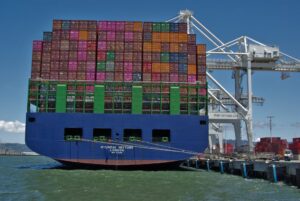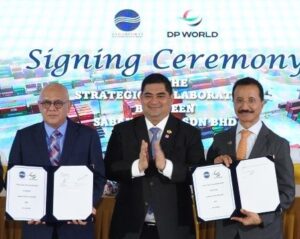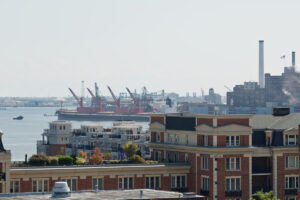Digital and automation specialists Real-Time Business Solutions (RBS) are at the forefront of the technological trends that are shaping ports, terminals and the wider maritime industry. The company has contributed a number of exclusive insights to PTI on subjects such as the Internet of Things, Cloud technology and automation.
Now, in an exclusive interview, RBS' CEO Harry Ngueyn has given his take on the industry and how it will be affected by the wave of smart and automated technologies in the near future.
To view RBS' solutions for ports and terminals, visit their AIS portal
PTI: What do you consider to be the biggest technological breakthroughs in the container terminal industry in recent years?
Automation has had a significant impact on the way terminals operate because it has allowed them to improve their operational efficiency and ability to manage larger vessels. As a result, terminals can keep up with the rest of the world with minimum dependency on human resources.
This has been a big breakthrough in our industry, as terminals can now enable container handling equipment, such as ASC, ARMG, ARTG, AVG, STS, etc., to automatically adapt to dynamic situations which optimize performance and output.
Operational costs are always increasing: vessels are getting larger, and the industry is now adapting to new and advanced technologies, such as automation, to keep up with developments.
The Cloud is another interesting innovation and industry-disrupting technology – because a Terminal Operating System (TOS) and connected devices can now be all be integrated, removing the need for on-premise IT infrastructure and cutting implementation time.
There are many other benefits to cloud computing, especially for TOS implementation, the most important of which is that it significantly saves time, effort, and money for terminals of any size.
Therefore, I believe cloud computing and automation are the biggest breakthroughs and the technologies that are going to have the biggest impact on our industry.
PTI: Please go into greater detail regarding automation. Is this an old or new concept and what is possible right now?
Automation is a very exciting new technology and is changing the way modern terminals operate. It is definitely not an old topic, even though the term has been around for a while now. I think we are currently stepping out of kindergarten as far as automation is concerned and need to start making it mainstream as soon as possible.
There have been entrepreneur terminals over the past decade that began the process quite early on. We are now fast-approaching the point where this will be the common approach, at least for yard management.
Pursuing automation has proven to be necessary for terminals to achieve more efficient operations, increased productivity, and keep up with their competitors, as well as handle an ever-increasing fleet of vessels.
There are now fully automated and some partially automated terminals in the world. This means that container handling equipment, such as ASCs, ARMGs, ARTGs, AVGs, STS’, etc., are being used in terminals to handle container moves.
Therefore, terminals are also in need of a TOS that can handle and communicate with equipment directly to perform the optimum container movements with least downtime.
We implemented our first automated terminal 15 years ago and our experience has now influenced the development of our TOPS Expert software, which includes all the above requirements.
It isn’t just container handling equipment that is automated, but also reefer monitoring, gate operating system and many other terminal operations. With RBS TOPS, we have considered the full spectrum of automation and have implemented this in terminals such as:
- Teluk Lamong Bay
- TPKS Terminal Petikemas
- Kuala Tanjung
- PT Prima Terminal Petikemas
PTI: What can we expect from automation, together with process automation, in the next few years? How will this help automated terminals overcome hurdles they currently face?
Firstly, let us just define the difference between equipment automation and process automation.
Equipment automation, as mentioned above, is the automated movement and interaction between TOS and automated equipment.
On the other hand, process automation (or software automation) is the software automatically performing the operational process: (re-)planning, controls, activation, dispatching, etc. without human intervention based on rules or in a future run by AI.
We can expect both to focus on automated equipment, with processes being automated in container terminals within the next few years. That means that TOS must keep up with updating technologies to help terminals operate with maximum efficiency.
In the future, new technologies will be released, and the automation of equipment will improve. Furthermore, AI and cloud computing will be integrated to make automation within terminals more advanced than ever before.
We have the technology available, the challenge now is to integrate it with hardware, processes and the workforce.
PTI: AI is often talked about as the leading technology of the future. How can it change the port and terminal business?
AI is a big buzz word and will be one of the technologies that lead us into the future. I think it can change the container terminal industry because it will improve efficiency and many other processes. But to do that it needs to be real AI, not forged AI that is just doing some fixed rule-based automated discussion making.
For example, AI can be used for berth, process and resource optimization to improve vessel scheduling, crane details, load data, discharge data, yard data, equipment data, human resource scheduling and much more.
It is such a powerful technology and at RBS, our sophisticated software, TOPS Expert has AI incorporated into the system.
PTI: What can we expect in the near future?
In the near future, we can expect more technologies to be developed, but there is a big push and focus on automation, cloud, and AI solutions.
These will, I believe, be mainstream in the not-so-distant future.
For our part, we will keep researching and developing the latest and best technology and plan for the future.
Being a software solutions provider, we must always be ahead in order to keep up with the changing demands of customers and rapidly evolving technologies.
RBS CEO Harry Nguyen
Realtime Business Solutions (RBS) is a wholly owned Australian company founded in 1991 by Harry Nguyen. The company specializes in software development and have worked exclusively in the Container Handling Industry for the past 25 years.
RBS most recent products include TOPS Expert Enterprise and Cloud. At RBS, we are the first to create and implement a full TOS on the cloud that incorporates technologies of automation, optimization, and real-time control and planning, all in one system.














